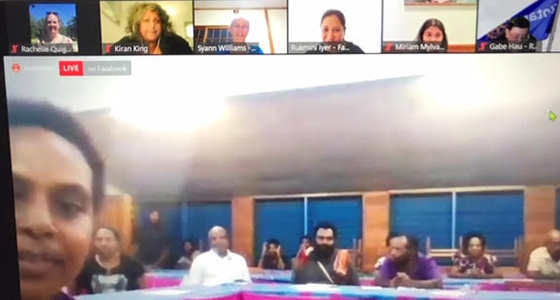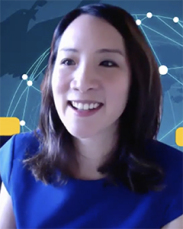
A delegation of 30 Papua New Guinea participants funded by the Evangelical Lutheran Church take part in the Global Cyber Peace Conference.

Elaine Pratley
By Elaine Pratley, Rotary Peace Fellow
This has not been an easy year. I attended my first virtual funeral because of local lockdowns due to COVID-19. Friends have lost jobs and loved ones, and the news about the global recession remains bleak. And to think that it was only three months ago when I thought the Australian bushfires were the biggest disaster to hit us this year! I feel the word “upheaval” would be an understatement, but I cannot think of a better word.
As a peacebuilder, conflict is at the core of my business. Peacebuilders do not consider conflict as inherently bad but recognize its potential for growth and positive change.
Nevertheless, I find it hard to foster hope and avoid despondency in the face of growing divisions over issues like Black Lives Matter and the resurgence in nationalist movements. How can one not be politically depressed given how readily our politicians take advantage of the pandemic to dehumanize others in order to score a few more points in the polls?
Perhaps the lesson to take from 2020 is that we need each other. Our lives are inextricably linked whether we like it or not. Every decision we make, no matter how passive or conscious, has ethical consequences, from how we respond to the lockdown restrictions, whether we choose to wear masks, whether we hoard food or buy locally, and how we respond to structural violence that benefits us.
Thankfully, I had the pleasure of being part of the committee that organized the Rotary Peace Fellowship Alumni Association’s inaugural Global Cyber Peace Conference on 27 June. Despite being a global event, we were all linked by our shared experiences of navigating life with COVID-19. My role infused me with renewed hope and joy when I saw firsthand what can be achieved when a group of passionate people come together to build peace. The global lockdown provided us with the impetus to redesign a conference that was not only truly global but also accessible to those in more geographically isolated regions. The events of 2019 and 2020, moreover, made the need to rethink a world grounded in peace both critical and timely.
Drawing on a Rotary Peace Fellow community of over 1,300 peace and social justice practitioners in 115 countries, this entirely volunteer-led initiative brought together more than 1,500 participants from all over the world in the course of 24-hours to “envision the world after the great pause.” Truth be told, when I started work on the conference, I only expected 200 attendees! Not a bad outcome for a global event that was put together in a mere six weeks of work! Moreover, through the generosity of contributors and sponsors, the conference was a free event, which provided a genuine opportunity for collaboration, knowledge sharing, professional development, and networking in the peace community.
The virtual conference consisted of over 50 panel sessions and workshops, providing 75 hours of content on issues such as youth in peace building, food security, gender and justice, technology, environment, and dance and drama in peace building. Some notable speakers included:
- Rotary International President Holger Knaack;
- Senator Penny Wong (Leader of the Opposition in the Australian Senate and Shadow Minister for Foreign Affairs);
- John Charles Bryan Barnes MBE, the legendary Jamaican-born English international former professional footballer, manager, pundit, and the Show Racism the Red Card activist;
- Irene Santiago (Nobel Peace Prize nominee and Executive Director of the historical NGO Forum on Women in China in 1995); and
- John Paul Lederach (internationally renowned peacebuilder and author of The Moral Imagination).
My biggest joy was spotlighting young peacebuilders like Zahra Bayani, a former refugee who moved to Australia in 2017 and received multiple awards when she completed high school last year. During the conference, Zahra interviewed Australia Senator Penny Wong, one of her role models. The interview gave Bayani the opportunity to share her dreams for a peaceful world with the senator.
I also enjoyed meeting a group of 30 participants in Papua New Guinea (PNG) during one of the breakout sessions. The participants had been funded by the Evangelical Lutheran Church of PNG through Australian aid to travel from the rural provinces to Lae to virtually connect to our conference.
As Rachelle Quiggin of the Australian Lutheran World Service noted, the conference provided participants with “new tools in their backpacks” and was a reminder that “we don’t need to be any more than we are to build peace” within their communities.
It’s stories like these that make my peacebuilding work meaningful. So, while 2020 will be remembered as a time of chaos, disruption, and conflict, I envision a future of peace and justice. And to make sure I don’t lose my sense of hope, I am going to surround myself with other peacebuilders who know that peace is possible, one small act at a time.
Join future conversations on peace by following the Rotary Peace Fellowship Alumni Association’s Facebook page
About the author: Elaine Pratley is a Rotary Peace Fellow and has worked in international development, criminal law, corporate law and start-ups in New Zealand and China. She is currently completing her PhD in food and peacebuilding at the University of Melbourne, Australia. She can be contacted at [email protected]
https://blog.rotary.org/2020/08/10/peacebuilding-during-a-time-of-upheaval/
